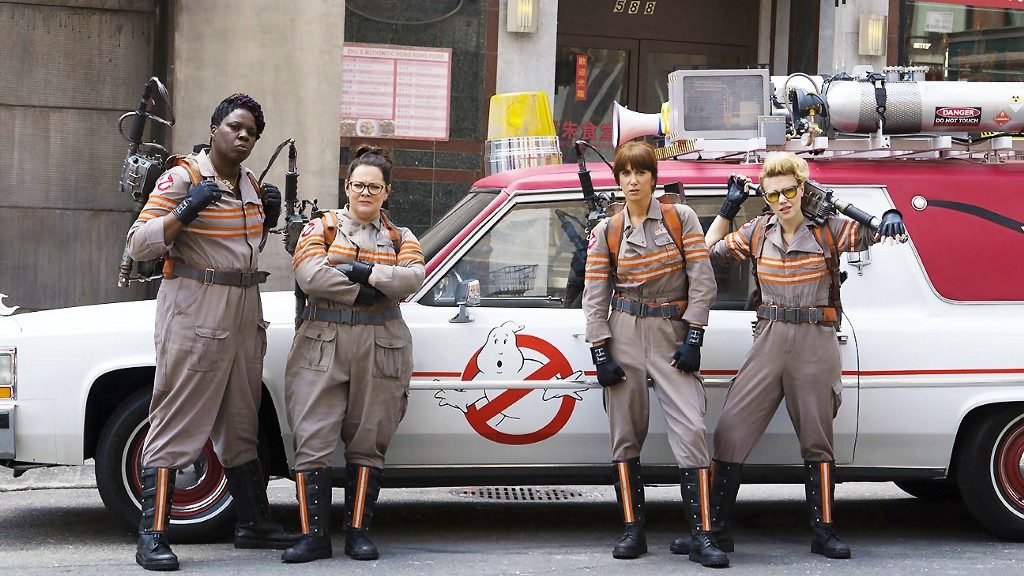
It seems as though the positive critical consensus is not enough to bust the ghosts haunting Paul Feig’s “Ghostbusters.” The latest haunting is the specter of double standards which plague female-led films. It looks like the success “Ghostbusters” has achieved won’t be enough to silence critics, who cry box office failure even as the film brings in strong returns.
In a July 18 article by The Hollywood Reporter, writer Pamela McClintock declared the film to be a flop, even though “Ghostbusters” had the biggest opening for a live-action comedy since “Pitch Perfect 2”. McClintock dismissively states that while the film “didn’t play like a chick flick,” it did not have the financial legs to become a summer tentpole, and would ultimately emerge as failure for Sony.
This dire prediction was echoed by other entertainment writers when “Ghostbusters” took the #5 spot on the July 22–24 weekend box office. The 54.3% drop in profits was considered a tumble for the film and a sign of it not performing well enough to restart the franchise or justify Sony pouring so much money into it.
While this seems grim at first glance, close analysis proves that the somewhat condescending concern over the box office returns is unnecessary. As of July 24, “Ghostbusters” had earned back over half its budget. A second week drop of 54.3 percent is similar to the second weekends of box office hits “The Avengers” (with a second week drop of 50.3 percent) and “The Dark Knight” (a second week drop of 52.5 percent). It is certainly a better second weekend than “Batman v. Superman,” which dropped 69.1 percent during its second weekend.
One of “Ghostbusters’” biggest box office competitors does not face nearly as much box office scrutiny, despite having a far grimmer box office outlook. “Star Trek Beyond’s” $59.6 million opening was a 15 percent drop from “Star Trek Into Darkness’” $70.1 million opening. Box Office Mojo says the film is looking at a $180–190 domestic haul, a steep drop from the box office returns of the “Trek” films proceeding it. However, there are no articles saying that Paramount is looking at a failure and that “Beyond” has doomed the franchise. In fact, a fourth film and a TV series are already in the works.
Looking at the response to these films side by side, the double standard could not be clearer. “Ghostbusters” is being subjected to far more scrutiny than other films being released, with journalists and bloggers being quick to say that the film is a failure. The numbers clearly prove otherwise, so why the rush to write the film off?

When asked by New York Times reporter Dave Itzkoff if Hollywood would look at “Ghostbusters” as a litmus test, director Paul Feig and star Kristen Wiig both expressed frustration with the fact the question had to be asked.
“How many litmus tests do we need? I’ve been hearing this for five years,” said Wiig.
While Feig acknowledged that the film was being looked at as a test, he wasn’t happy about this fact. “It’s not fair, that in 2016 we should be in this situation where this is standard,” he said. “That’s where Hollywood should go, ‘Wow, we are so behind the times.’”
Feig and Wiig, along with Feig’s muse Melissa McCarthy, have both faced this question time and time again since their first film together, “Bridesmaids,” was released in 2011. The Judd Apatow-produced film was a surprise smash hit and even garnered an Academy Award nomination for McCarthy. That film was supposedly proof that women-centric comedies are profitable, yet in the years following, the same questions are still asked.
“It’s unfair that women have to be put through litmus tests all the time. What if ‘Ghostbusters’ doesn’t work?” Feig asked in an interview with Lindsay Bahr. “If a giant tentpole starring men doesn’t do well, people don’t go, ‘oh well, we can’t have guys in movies anymore.’”
Kay Cannon, the writer behind the “Pitch Perfect” series, voiced similar thoughts. “I feel like with every movie, we’re auditioning to be members of the business,” she observed.
The underlying message that if a female-led film underperforms at the box office means that future films are in jeopardy is, to put it mildly, troubling. The pressure on female-centric films to succeed at the box office is undeniable. There is no room for a margin of error here. Not when the future of representation is placed on the line.
Think about superhero movies. Leaked emails from Marvel Entertainment CEO Ike Perlmutter show that studio executives question the profitability of female-led superhero films due to three female-led flops: “Catwoman,” “Elektra,” and “Supergirl.” On the flip side, when two consecutive “Hulk” films flopped, rather than scrap the character altogether Marvel Entertainment simply hired a third actor. And while the actresses in the three failed female superhero films have yet to find work in the genre again, actors such as Ryan Reynolds and Ben Affleck, stars of box office flops “Green Lantern” and “Daredevil,” were given second chances in “Deadpool” and “Batman v. Superman” respectively. Box office performance means absolutely nothing for the future of male-lead films; for female-lead films, performance is everything.
Both DC and Marvel have one female-led title each on their upcoming slate, and we will most likely enter another round of the “can women front action movies” debate when both open. However, if both studios are willing to give male titles second chances after disastrous flops, why must “Wonder Woman” and “Captain Marvel” perform better than their peers in order to justify their continued existence? Women-directed features face similarly ludicrous expectations. To quote Anne Hathaway, “sometimes movies don’t work, and I feel like if it stars a woman or is directed by a woman, the wheels can’t fall off the train. If this movie directed by a woman does well, and this movie directed by a woman does well and then one doesn’t, it’s ‘oh, people don’t like movies directed by women.’”
Right now, all roads in film culture seem to lead back to “Ghostbusters,” but soon new films will rise up to emerge as the Next Great Case for Female Representation. Upcoming candidates for discussion include “Rogue One: A Star Wars Story” and “Wonder Woman,” which will have the double edged sword of being a women-centric film directed by a woman. Once more we will be sucked into the seemingly endless cultural conversation surrounding women in film. Once more women will, as Kay Cannon said, have to audition to be members of the business.
So, if “Ghostbusters” must stand for anything, let it stand as the last time a female-led film had to work doubly hard to prove its worthiness to exist. Let the conversation shift from “are films about women profitable” to “since films about women are profitable, why aren’t more being made?” Let women be allowed to star in and write or direct both good films and bad films, just as men can.
It’s 2016. It’s time to stop using films as a litmus test, and time change the face of cinema. Otherwise, we let the trolls and goblins that have dogged Ghostbusters since day one win.







